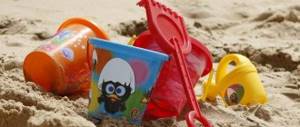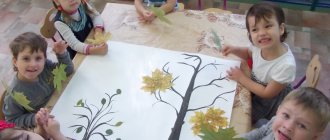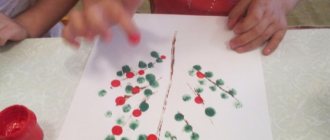Variety of games
Until the child goes to kindergarten, that is, until about 3 years old, he does not have any knowledge of what a game is. More precisely, he has a game, but it is at the elementary level. When a child has a sufficient vocabulary, some life experience, and peers around him, then we can talk about play as a means of development, since it is collective play, invented and meaningful, that has the greatest value.
- Role-playing games
We all remember our childhood games of “hospital”, “store”, “family” - we assigned roles for friends, and maybe even for all our relatives, came up with each of our clearly assigned roles, imagined a plot, and played with pleasure. This is called a role-playing game, because the name itself already contains the essence of this gaming activity.
This is where the child’s character, his concept of relationships between people, his preferences for a particular social status or profession are most clearly manifested. And even if some role alarms you or the child’s behavior does not satisfy you, remember that while this is a game, the child does not need to be distracted. Note to yourself those oddities that alarmed you the most, and then talk about this with your child, find out his motives - perhaps it was your behavior that caused such a performance of roles.
Role-playing play, as a means of child development, has an undeniably important role, especially in the formation of personal qualities and the ability to communicate and live in society. The child’s imagination develops, because in each game he gets used to a new role and must fully correspond to it.
And if everything is clear with the roles, then you will have to think about the plot. If a child himself comes up with a plot and direction for the game, this speaks of his unusually developed imagination, ability to think broadly and creatively, and to be fluent in playful ways of acting. If your baby cannot think so broadly yet, come up with a plot yourself.
But the most important thing is the inventory, the helper items that will turn the game into some semblance of real life. Agree, playing with real pills, a doll syringe and bottles is much more interesting than with an imaginary thermometer. Perhaps you have old USSR money lying around at home - give it to your child, let it be an interesting help for playing “shop”.
- Didactic games
The role of play in the development of personality is not only in the formation of certain feelings and qualities of the child, but also in the child’s knowledge of the world, teaching him elementary, but much-needed knowledge about shape, color, size, and space.
Didactic games are aimed more at learning than entertainment. But thanks to bright cubes, figurines, educational toys, the child takes up the game with pleasure, learning to group objects, having previously compared them according to given criteria: by purpose, by external features (yellow objects to yellow, or cubes in one basket, and balls in another ).
Thanks to didactic games, the child develops attention, concentration, perseverance, cognitive abilities develop, and through the game he will quickly learn to distinguish objects.
- Outdoor games
Movement is life! And in childhood, we didn’t need to talk about this, because any child cannot sit still - he loves to run, jump, and hide. Excessive activity of children needs to be directed in the right direction, that is, into play.
We all know very well the game with chairs, the number of which is 1 less than the number of players. While the music is playing, the children dance around the chairs, but as soon as the music stops, everyone must sit on a chair. The one who does not get the chair is eliminated from the game. An interesting, funny, active game that develops a desire for a goal in a child.
The role of outdoor play in a child’s development is to help him develop speed in movement and thinking, discipline and the ability to play by the rules. In addition, it is in outdoor games that a child often sees treachery and a desire to “go ahead” in other participants. If you notice that your child is doing the same, explain to him that bad manners and rudeness can be overcome with cunning.
Outdoor games are a great way to distract an active child from dirty tricks, or to liberate a quiet one.
Gnomik.ru recommends Rmh24.ru Urgent repair of refrigerators at home from Rmh24 We repair refrigerators of all brands. Free visit of a specialist and diagnostics!
Use promo code: Gnomic.ru
and get a guaranteed 10% discount
We work in Moscow and the region.
Call
Call a specialist
The importance of play in the life of a preschool child
Kharchenko O.I., Medvedeva E.A. The importance of play in the life of a preschool child // Sovushka. 2020. N2 (16). URL: https://kssovushka.ru/zhurnal/16/ (date of access: 10.10.2020).
Order No. 313523
How often do we hear a request from children: “Play with me!” And how much joy they get when we start playing with them, following their desires, fulfilling their demands. However, play is not only pleasure and joy for a child, which in itself is very important. With its help, you can develop the child’s attention, memory, thinking, imagination, i.e., qualities that are necessary for later life. In play, a child acquires new knowledge, skills, abilities, and develops abilities; what’s most interesting is that sometimes he doesn’t even know it.
And this is certainly true. Game is one of those activities that is used by adults to educate and educate children, to develop their thinking, imagination, speech, and various methods and means of communication. In addition, play is a unique way of learning social experience, characteristic of preschool age. In play, all aspects of a child’s personality are formed and developed; significant changes occur in his psyche, which prepare the transition to a new, higher stage of development.
The importance of play in preschool age is especially great, since it is during this period that children develop character traits, moral and aesthetic qualities are formed, abilities develop, and the process of mental development takes place. In psychology, play is understood as one of the leading types of activity, which is aimed at creating and mastering social experience, developing communication not only between children, but also between children and adults.
One of the important factors in the overall mental development of children is communication. The development of a child as an individual is impossible without human communication. A lack of communication between a child and an adult leads to mental retardation, pedagogical neglect, and developmental delays. Therefore, adults need to spend as much time as possible communicating with children. In a preschool educational institution, the role of adults is played by educators, taking on enormous responsibility for the development of children.
Since play is the leading activity of children and it is through play activity that their entire preschool childhood passes, the process of communication between children and adults will most effectively be carried out during play activity.
Kindergartens have accumulated sufficient experience in using play activities for the development, education and training of children, but educators often forget about the main advantage of the game: the possibility of easy communication between adults and children during play activities. Games sometimes turn into an activity where the teacher acts as a leader, dictating what needs to be done, and not as a playing partner - as a result, both the independence of children and the development of communication skills during the game are limited. And the development of children’s communication through interaction with adults, as well as the development of play activities, is a priority task of a preschool organization.
Very often we hear from young teachers: “We don’t have multimedia projectors, we don’t have other types of modern teaching aids.” Yes, we agree that we live in the modern world, that everyone, even rural children, has gadgets, it’s difficult to surprise them with anything . But this is the role of a truly competent teacher, in order to interest the child in any environment, in any situation, to find the unusual in everyday space. We consider ourselves very lucky in this regard, because in rural areas there are so many opportunities for understanding the environment and exploring it.
What about the game? Now there are a lot of games with ready-made attributes and plots. Children chew these games until they lose interest. But it’s worth remembering our childhood, when we used, in pedagogical language, “substitutes.” Try inviting your children to do the same. We assure you that dandelion stems as pasta, an imaginary gas stove or a hob on the side of a sandbox will contribute to the development of such important mental processes as imagination and thinking much better than ready-made plastic, even the most wonderful toy kitchens. It is very important to teach children to play. Once upon a time, the term “underplayed children” was very common, and these children found it more difficult to study at school; they retained infantilism and a breakdown in the unreal world longer. And you and I know how such disruptions can end.
Therefore, in the bustle of our days, find time for your baby. Remember your favorite children's games, teach them to fantasize and make up real objects. We assure you that this time will not be wasted not only for the children, but also for you
Games with rules: essence and classification
Definition 1
Games with rules are a group of games with established rules that are specially created to solve certain problems in teaching and raising children.
These games have ready-made content, and their mandatory component is fixed rules.
The solution to necessary problems occurs through the child’s playful actions when performing a particular task. This type of games is a complex and multifaceted phenomenon with its own functions: educational, entertaining, communicative, relaxation, psychotechnical, compensatory and self-expression functions.
Through play, a child reflects the adult real world and strives to learn everything through play. Play is a great opportunity for a child’s learning in a preschool.
K.D. paid much attention to didactic games. Ushinsky, P.F. Lesgaft, L.N. Tolstoy, A.P. Usova and many others.
For senior preschool age, the leading type of game is a game with rules. During these games, important changes in the child’s psyche occur, arbitrary forms of communication with people around him are formed, and preparation is underway for a new complex activity - learning.
Finished works on a similar topic
- Course work Games with rules in preschool age 420 rub.
- Abstract Games with rules in preschool age 240 rub.
- Test work Games with rules in preschool age 220 rub.
Receive completed work or specialist advice on your educational project Find out the cost
Games with rules are divided into two large groups depending on the nature of the learning task. This:
- didactic games;
- outdoor games.
In turn, these groups are classified on different grounds. For example, the content of didactic games can be mathematical, speech, or natural history.
According to the didactic material used during the game, games with objects and toys, word games, and pastel-printed games are distinguished.
According to the degree of mobility, the second group of games is classified as follows - games of low, medium, high mobility.
According to the movements that predominate in the game - games with jumping, games with dashes, etc.
Depending on the objects used, outdoor games can be with a ball, with hoops, with ribbons, etc.
Among the active and didactic games there are plot games where the players need to fulfill their roles, for example, “cat and mouse”, “souvenir shop”, as well as plotless games - “magic wand”, “what has changed?”.
In a game with rules, a child is attracted by the desire to perform game actions, achieve results, and win.
Too lazy to read?
Ask a question to the experts and get an answer within 15 minutes!
Ask a Question
During the gameplay, a certain task is solved - not just to move pictures from one place to another, but to place them in pairs, select them according to a certain characteristic, etc.
The child’s behavior during play is subject to game rules, as A.N. also spoke about. Leontyev - to master the rules of the game means to master one’s behavior, and this fact determines the educational value of the game.
Each participant in games with rules can compare their results and actions with the results of other participants. The child independently learns to evaluate himself in the game, and this develops in preschoolers the ability to self-esteem and mutual evaluation. Seeing his own mistakes in the game in comparison with other children, the child strives for self-improvement. Successful play raises the child's authority and encourages him to new achievements.
Note 1
Playing with rules is thus an important means of learning and education for preschool children.
Consultation for parents. Play in a child's life
About the role of games for preschool children
Consultation for parents. The topic of the conversation is “Game in a child’s life”
Author: Vera Aleksandrovna Orekhova, teacher at MBDOU “General Developmental Kindergarten No. 125”, Voronezh Description: this material will be interesting and useful for teachers for consulting and working with parents. Goal: To attract parents' attention to the importance of play in a child's life. Questions for discussion: 1. What is a game? The significance and importance of play in the life and development of a child; 2. Recommendations and advice on choosing family games with your child. “A game is a huge bright window through which a life-giving stream of ideas and concepts about the world around us flows into the child’s spiritual world.
Play is the spark that ignites the flame of inquisitiveness and inquisitiveness.” Sukhomlinsky V.A. Childhood is not only the happiest and most carefree time in a person’s life, it is the time of formation of a future personality.
That’s why smart, healthy games
that develop, educate and teach a healthy lifestyle are so important for a child.
Play
is the leading activity of a child.
The game develops all mental processes (memory, thinking, creativity, etc.). The game
a huge impact on mental development, speech development, and physical development.
That is, the game
contributes to the harmonious development of the child’s personality.
For any child, play
is a way of learning about the world and their place in this world.
It is in play that a child grows and develops as a person, acquires communication skills and behavior in society. And from the earliest years of life, it is necessary to put the child in such conditions so that he plays as much as possible. And the task of adults is not only not to interfere with the child’s games, but also to create a developing gaming environment, to teach the child to play a variety of games. It would seem that there could be something interesting in a home that is familiar to the smallest detail, but with a certain amount of enthusiasm you can turn home games into the most exciting and desirable ones for your baby. So what can you play at home? Games of our childhood. Cold-Hot
The most common and very interesting game, when one participant hides a certain object in the house, and the second looks for it, guided by clues. You can direct as you move away or approach the object, saying “cold” or “hot” respectively. Put your acting skills to work by putting a spin on the words "cool" and "aren't you cold?" the right intonation. The game will become even more interesting if you hide not only the object itself, but also the clues. First, the first clue is found, where there may be a picture or a pointer to the right direction, then the second, etc. Try to hide the surprise as well - the child will be delighted!
Crocodile
It is especially interesting if several people are involved. A word is guessed, and then a pantomime is performed in order to convey its meaning to the participants. One of the variants of the game is the verbal representation of the hidden object and its use without directly indicating the desired word.
Games for attention, development of imagination, fantasy. Historical journey
Place different objects around the apartment and give them specific names. For example, a bowl is the sea, a pillow is the mountains, and a large air mattress is the Gobi Desert. Tell your child a story where he is the main character, and then go on a journey through dense forests in the form of a row of chairs and conquer the summit of soft Everest. You can take a car or a doll as a hero-traveler, and also diversify the game by drawing a real treasure map indicating the desired route.
Role-playing games. Mothers and daughters are the opposite.
Children love role-playing games. They play out situations taken from life, which is both educational and developmental. But there are slight differences in the perception of role-playing play in early childhood and preschool age. A child at an early age simply copies the behavior of an adult, and for him role-playing is more an action, and not the role itself, as such. Toys are just things that replace those that adults use. Therefore, if you play doctor with your child, then do not demand too much from him. He will check you, treat you, but in no case will he get used to the role. If the child is older, then actions will no longer be so important for him. The main thing is to assign roles and live what adults face every day. An excellent role-playing game for children of any age - “mother-daughter” in reverse. You will have to play a daughter or son, and your child will have to play a parent. This is a great opportunity for you to walk in each other's shoes. You can be capricious and play around. The child, in turn, learns how you feel when he himself does not obey. This way, the children will understand you better, and perhaps they will also become interested in household chores!
A game to develop creativity and fine motor skills. Make it beautiful!
Give your child various objects: buttons, shells, scraps, wrapping paper, foam, beads, cardboard, glue, plasticine... Offer to create something very beautiful out of all this. Do not interfere with the work: no advice, no ideas. Just help with fastening, holding, cutting, bending.
Games to develop attention and intelligence. The bird is not a bird.
A fun game for attention and knowledge of birds.
An adult reads poems. The children's task is to listen carefully and, if a word is heard that does not mean a bird, give a signal - stomp or clap. Be sure to ask your child what is wrong. Clarify: “Who is the fly?” Birds flew in: Pigeons, tits, Flies
and swifts... Birds flew in: Pigeons, tits, Storks, crows, Jackdaws,
macaroni
... Birds flew in: Pigeons, tits, Swans, martens
,
Jackdaws and swifts, Seagulls and
walruses
... Birds flew in: Pigeons, tits, seagulls, pelicans,
mikes
and eagles.
Birds flew in: Pigeons, tits, herons, nightingales, perches
and sparrows.
Birds flew in: Pigeons, tits, Ducks, geese, owls, Swallows, cows
... Birds flew in: Pigeons, tits,
Sticks
and swifts,
Butterflies
, siskins, Storks, cuckoos, even scops owls, swans and ducks - and thanks for the joke!
Game “The Third Wheel”
In this game, children learn to classify objects according to the criteria specified in the conditions. For children 3-5 years old the conditions are simpler. For example: An adult says three words - owl, crow, fox. The child must quickly analyze these three words in his mind and determine that all three words relate to living nature, however, the owl and the crow are birds, but the fox is not. Therefore, the fox is superfluous here. More examples for younger preschoolers: - milk, juice, bread - all three words mean edible. But they drink milk and juice and eat bread. - car, horse, tram; - hat, scarf, boots; - rose, birch, Christmas tree. For children 5-7 years old, the tasks become more complicated: - rain, snow, river; - doctor, tourist, driver; - shadow, sun, planet; - frost, blizzard, January; - stone, clay, glass; - door, carpet, window; - sea, river, swimming pool.
We can talk for a long time about different games, but the main thing for you is to listen to the interests and needs of your child, understand what he is already interested in, and what else should be introduced to him. And then, believe me, you will be an excellent parent and a wonderful friend for him! What else do you need?..
“Play is the genetic basis, the source, the root of all creativity, its preparatory stage” (L. S. Vygotsky).
We recommend watching:
Scenario of dance entertainment for children 5-7 years old. Creativity of preschoolers. Advice for parents Advice for parents. Child's readiness for school Recommendations for parents from a speech therapist
Similar articles:
Consultation for parents “Modern children. Problems of education"
Fairy tale "Three Bears"
Material: Instead of bears, children were offered whole matches and halves (with pre-cut sulfur heads), and instead of beds - matchboxes.
Goal: The children had to choose for themselves which object would replace this or that character.
Result:
All children, even the smallest ones, made their choice in the same way: half a match is Mishutka, whole matches are mom and dad, boxes are beds, etc. When they were asked to make a different choice (half a match - Mama, and a whole match - Mishutka), the guys quite seriously said: “It doesn’t happen that way.”
But object play, play with substitute objects, is only a prerequisite for developed role-playing play, which becomes the leading activity in preschool age.
In children aged 3-4 years, the basis of the game is the reproduction of relationships among themselves. The world is opening up to children more and more fully. They already see that the driver not only turns the steering wheel, but also enters into certain relationships with the passengers, that the doctor does not just give an injection to the patient, but also communicates with him. The central point in the games of preschoolers is the relationship between adults and the peculiarities of their communication.
But in order to reproduce these relationships, it is necessary to maintain a certain playing role. That is, to fulfill the responsibilities that each role imposes and to exercise the rights that are given by it. The doctor must be polite and attentive to patients and follow the necessary sequence of actions during treatment. At the same time, he has the right to use toys - attributes that he has. The patient is obliged to follow the doctor’s instructions, but at the same time has the right to complain about a variety of diseases and demand new medications.
In order for the roles to be more “expanded,” preschoolers move from individual actions with toys (feeding, dressing, putting them to bed) to reproducing a whole chain of actions. Gradually the child begins to fulfill the role he has assumed.




